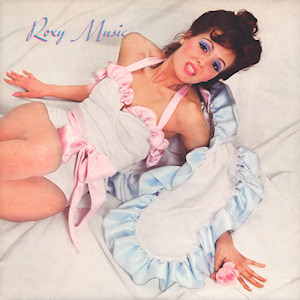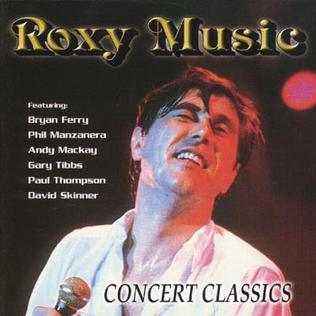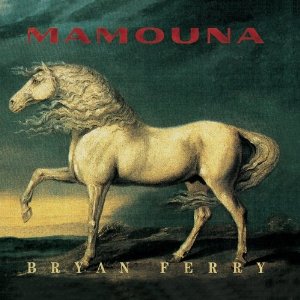Related Research Articles

Roxy Music are an English rock band formed in 1970 by lead vocalist and principal songwriter Bryan Ferry and bassist Graham Simpson. By the time the band recorded their first album in 1972, Ferry and Simpson were joined by saxophonist and oboist Andy Mackay, guitarist Phil Manzanera, drummer Paul Thompson and synthesizer player Brian Eno. Other members over the years include keyboardist and violinist Eddie Jobson and bassist John Gustafson. The band split in 1976, reformed in 1978 and split again in 1983. In 2001, Ferry, Mackay, Manzanera and Thompson reunited for a concert tour and have toured together intermittently ever since, most recently in 2022 to celebrate the 50th anniversary of their first album. Ferry has also frequently enlisted band members as backing musicians during his solo career.

Phillip Geoffrey Targett-Adams, known professionally as Phil Manzanera, is an English musician, songwriter and record producer. He is the lead guitarist with Roxy Music, and was the lead guitarist with 801 and Quiet Sun. In 2006, Manzanera co-produced David Gilmour's album On an Island, and played in Gilmour's band for tours in Europe and North America. He wrote and presented a series of 14 one-hour radio programmes for station Planet Rock entitled The A-Z of Great Guitarists.

For Your Pleasure is the second studio album by the English rock band Roxy Music, released on 23 March 1973 by Island Records. It was their last to feature synthesiser and sound specialist Brian Eno.

Roxy Music is the debut studio album by English rock band Roxy Music, released on 16 June 1972 by Island Records.

Concerto is a live album by Roxy Music. All tracks were recorded during the group's "Manifesto Tour" at the Rainbow Music Hall, Denver, Colorado on April 12, 1979, except for Mother of Pearl and Editions of You, which were recorded earlier that month at the Oakland Auditorium, Oakland, California. The album was released in 2001; three years after it was previously released as Concert Classics in 1998. It was released again under the title Ladytron on August 19, 2002 on Superior Records. Roxy Music had no input to this album as it is not an official Roxy Music release but released under license.

Concert Classics is a live album by Roxy Music. All tracks were recorded during the group's "Manifesto Tour" at the Rainbow Music Hall, Denver, Colorado on April 12, 1979. The album was released nineteen years later in February, 1998, and released again in 2001 with two extra tracks, under the name Concerto. Roxy Music had no input to this album as it is not an official Roxy Music release but released under license.

Let's Stick Together is a 1976 album by Bryan Ferry. His third solo release, it was his first following the disbanding of Roxy Music earlier in the year. Unlike Ferry's two previous solo releases, Let’s Stick Together was not a dedicated album project, instead predominately made up of singles, B-sides, and an EP. Three tracks were exclusive to the LP, all remakes of Roxy Music tracks: "Casanova", "2HB", and "Chance Meeting". It had a generally favourable critical reception, but only just made the UK Top 20.

These Foolish Things is the debut solo studio album by Bryan Ferry, who at the time was still Roxy Music's lead vocalist. The album was released in October 1973 on Island Records in the United Kingdom and Atlantic Records in the United States. It is considered to be a departure from Roxy Music's sound, being made up of far more 'straight' versions of standards. Additionally, where Roxy Music's albums were of songs composed by the band, These Foolish Things was a covers album. It was a commercial and critical success, peaking at number five on the UK Albums Chart. It received a gold certification from the British Phonographic Industry in May 1974.

"Virginia Plain" is a song by English rock band Roxy Music, released as their debut single in August 1972. Written by Roxy frontman Bryan Ferry, the song was recorded by the band in July 1972 at London's Command Studios. Backed with "The Numberer", an instrumental composed by Andy Mackay, as a single the song became a Top 10 hit in the UK, peaking at number four.
"If There Is Something" is a song written by Bryan Ferry and recorded by Roxy Music for their eponymous debut album in 1972. A live version appears on their Viva! live album.
"2HB" is a song written by Bryan Ferry and first recorded by Roxy Music for their 1972 debut album, Roxy Music. Ferry also recorded a version for his 1976 solo album, Let's Stick Together.
"Bitters End" is the final song on Roxy Music's self-titled debut album, released in 1972. The song is based on a group vocal arrangement done in a satirical 1950s doo wop style. "Bitters End" was not performed live often, however Roxy Music did perform it on 23 June 1972 for John Peel on the BBC sessions.
"Ladytron" is a song by Bryan Ferry, recorded by his band Roxy Music and appearing on their debut album. The British electronic band Ladytron took their name from this song.
"In Every Dream Home a Heartache" is a song written by Bryan Ferry, originally appearing on his band Roxy Music's second studio album, For Your Pleasure (1973).

"Street Life" is the opening track of English rock band Roxy Music's third album Stranded. Written by lead singer Bryan Ferry, the song is an ode to modern life that features sound effects of street noise alongside dissonant synth noises courtesy of newly recruited member Eddie Jobson. Producer Chris Thomas provides bass on the song.

The Best of Roxy Music is a greatest hits album by English art rock band Roxy Music, released in 2001. The album includes at least one song from all eight of the band's studio albums and all three of their non-album single A-sides. The songs are arranged in reverse chronological order.

Diamond Head is the first studio album by English rock musician Phil Manzanera. It was released in 1975, originally on Island Records in the UK and in the US on Atco Records. The sound quality on the US album was deemed to be worse than the UK album, so the UK import became a popular seller in the speciality record shops who sold Roxy Music and other UK bands. The diesel locomotive featured on the cover art is an EMD E9.

Live is a double live album by English art rock band Roxy Music, released in 2003. Their fourth official live album, it contains performances from a variety of venues on their 2001 reunion world tour, and represents the entire set list from those concerts. Live was packaged in a Digipak case.

Mamouna is the ninth solo studio album by the English singer Bryan Ferry, released on Virgin Records first on 31 August 1994 in Japan and then on 5 September in the UK. It was Ferry's first album of original material in seven years and he spent six years writing and recording it, under the working title Horoscope. The album peaked at number 11 on the UK Albums Chart.

"Pyjamarama" is a song by English rock band Roxy Music, released as a single in February 1973. It reached a peak of number 10 on the UK Singles Chart after a twelve week charting stint. The song was written by Bryan Ferry, and the first one he wrote with the guitar as his instrument. and was backed by an instrumental non-LP track called "The Pride and the Pain" written by Andy Mackay.
References
- 1 2 Allen, Jeremy (25 February 2015). "Roxy Music: 10 of the best". The Guardian .
- ↑ Ian MacDonald. "Party fun from an old poseur", NME , 8 September 1973
- ↑ "Cellular Chaos EP, by Cellular Chaos".